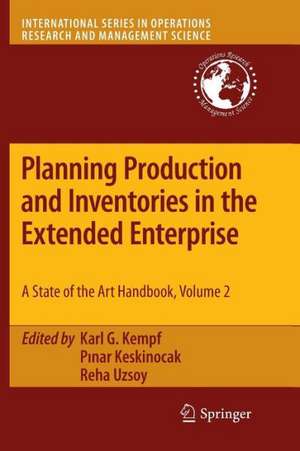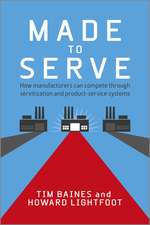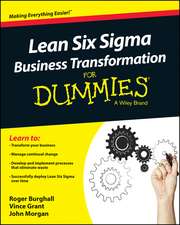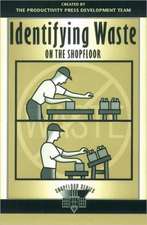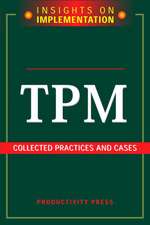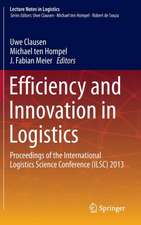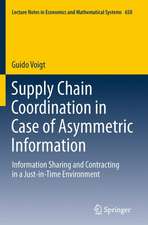Planning Production and Inventories in the Extended Enterprise: A State-of-the-Art Handbook, Volume 2: International Series in Operations Research & Management Science, cartea 152
Editat de Karl G. Kempf, Pınar Keskinocak, Reha Uzsoyen Limba Engleză Paperback – 20 apr 2013
| Toate formatele și edițiile | Preț | Express |
|---|---|---|
| Paperback (2) | 711.89 lei 43-57 zile | |
| Springer – 20 apr 2013 | 711.89 lei 43-57 zile | |
| Springer Us – 5 sep 2012 | 714.81 lei 43-57 zile | |
| Hardback (2) | 965.34 lei 43-57 zile | |
| Springer – 6 apr 2011 | 965.34 lei 43-57 zile | |
| Springer Us – 8 noi 2010 | 968.19 lei 43-57 zile |
Din seria International Series in Operations Research & Management Science
- 20%
 Preț: 331.25 lei
Preț: 331.25 lei - 9%
 Preț: 696.06 lei
Preț: 696.06 lei - 20%
 Preț: 570.62 lei
Preț: 570.62 lei - 18%
 Preț: 1132.02 lei
Preț: 1132.02 lei - 18%
 Preț: 773.72 lei
Preț: 773.72 lei -
 Preț: 170.40 lei
Preț: 170.40 lei - 17%
 Preț: 459.35 lei
Preț: 459.35 lei - 17%
 Preț: 360.48 lei
Preț: 360.48 lei -
 Preț: 263.40 lei
Preț: 263.40 lei - 24%
 Preț: 905.31 lei
Preț: 905.31 lei - 17%
 Preț: 460.09 lei
Preț: 460.09 lei - 17%
 Preț: 459.35 lei
Preț: 459.35 lei - 20%
 Preț: 631.58 lei
Preț: 631.58 lei - 13%
 Preț: 480.01 lei
Preț: 480.01 lei - 18%
 Preț: 738.28 lei
Preț: 738.28 lei - 18%
 Preț: 1225.94 lei
Preț: 1225.94 lei - 18%
 Preț: 948.92 lei
Preț: 948.92 lei - 18%
 Preț: 703.88 lei
Preț: 703.88 lei - 18%
 Preț: 957.44 lei
Preț: 957.44 lei - 15%
 Preț: 651.84 lei
Preț: 651.84 lei - 20%
 Preț: 336.21 lei
Preț: 336.21 lei - 15%
 Preț: 641.03 lei
Preț: 641.03 lei -
 Preț: 404.29 lei
Preț: 404.29 lei - 18%
 Preț: 950.21 lei
Preț: 950.21 lei - 15%
 Preț: 649.06 lei
Preț: 649.06 lei - 18%
 Preț: 725.75 lei
Preț: 725.75 lei -
 Preț: 394.12 lei
Preț: 394.12 lei - 18%
 Preț: 951.47 lei
Preț: 951.47 lei - 15%
 Preț: 639.59 lei
Preț: 639.59 lei - 18%
 Preț: 773.06 lei
Preț: 773.06 lei - 18%
 Preț: 889.29 lei
Preț: 889.29 lei - 15%
 Preț: 655.60 lei
Preț: 655.60 lei - 15%
 Preț: 640.06 lei
Preț: 640.06 lei
Preț: 711.89 lei
Preț vechi: 837.52 lei
-15% Nou
Puncte Express: 1068
Preț estimativ în valută:
136.26€ • 148.06$ • 114.54£
136.26€ • 148.06$ • 114.54£
Carte tipărită la comandă
Livrare economică 21 aprilie-05 mai
Preluare comenzi: 021 569.72.76
Specificații
ISBN-13: 9781461428497
ISBN-10: 1461428491
Pagini: 604
Ilustrații: XVI, 588 p.
Dimensiuni: 155 x 235 x 32 mm
Greutate: 0.84 kg
Ediția:2011
Editura: Springer
Colecția Springer
Seria International Series in Operations Research & Management Science
Locul publicării:New York, NY, United States
ISBN-10: 1461428491
Pagini: 604
Ilustrații: XVI, 588 p.
Dimensiuni: 155 x 235 x 32 mm
Greutate: 0.84 kg
Ediția:2011
Editura: Springer
Colecția Springer
Seria International Series in Operations Research & Management Science
Locul publicării:New York, NY, United States
Public țintă
Professional/practitionerCuprins
Chapter 1. Production Planning Under Uncertainty with Workload Dependent Lead-Times: Lagrangean Bounds and Heuristics.- Chapter 2. Production Planning and Scheduling: Interaction and Coordination.- Chapter 3. The Effects of Production Planning on the Dynamic Behavior of a Simple Supply Chain: An Experimental Study.- Chapter 4. Supply and Demand Synchronization in Assemble-to-Order Supply Chains.- Chapter 5. Quantitative Risk Assessment in Supply Chains: A Case Study Based on Engineering Risk Analysis Concepts.- Chapter 6. A Practical Multi-Echelon Inventory Model with Semiconductor Manufacturing Application.- Chapter 7. A mechanism Design Approach for Decentralized Supply Chain Formation.- Chapter 8. Procurement Network Formation: A Cooperative Game Approach.- Chapter 9. Design Flexible Supply Chain Contracts with Options.- Chapter 10. Build-to-Order Meets Global Sourcing: Planning Challenge for the Auto Industry.- Chapter 11. Practical Modeling in Automotive Production.- Chapter 12. Why is it so Hard to Build and Validate Discrete Event Simulation Models of Manufacturing Facilities?.- Chapter 13. A Practical Approach to Diagnosing and Tuning a Statistical Forecasting System.- Chapter 14. The Ongoing Challenge - Creating an Enterprise-wide Detailed Supply Chain Plan for Semiconductor and Package Operations.- Chapter 15. Production Planning in the Plastics Industry.- Chapter 16. Model Predictive Control in Semiconductor Supply Chain Operations.- Chapter 17. Models and Methods for Production Scheduling in the Pharmaceutical Industry.- Chapter 18. Developing a Computerized Scheduling System for the Steelmaking - Continuous Casting Process.- Chapter 19. A Multi-Model Approach for Production Planning and Scheduling in an Industrial Environment.- Chapter 20. Fuzzy Logic Based Production Scheduling and Rescheduling in the Presence of Uncertainty.- Chapter 21. The Summing-Up.
Recenzii
From the reviews:
“A handbook on this topic is a valuable resource for academics and practitioners who want to access information or research a related topic. … The objective is to bridge the gap between quantitative academic research on decision support models and algorithms and the practical needs of industry. The book achieves this by giving a state-of-the-art overview of theory, methodologies, modeling approaches, and industrial practices, and by identifying gaps that future should address. … Volume 2 contains more detailed research results and applications from different industries.” (Stefan Minner, Interfaces, Vol. 41 (5), September-October, 2011)
“A handbook on this topic is a valuable resource for academics and practitioners who want to access information or research a related topic. … The objective is to bridge the gap between quantitative academic research on decision support models and algorithms and the practical needs of industry. The book achieves this by giving a state-of-the-art overview of theory, methodologies, modeling approaches, and industrial practices, and by identifying gaps that future should address. … Volume 2 contains more detailed research results and applications from different industries.” (Stefan Minner, Interfaces, Vol. 41 (5), September-October, 2011)
Notă biografică
Karl G. Kempf is an Intel Fellow and director of Decision Engineering for the Intel Architecture Group at Intel Corporation. He currently focuses on product design and development decision problems, and previously was responsible for supply chain decision problems in Intel's Technology and Manufacturing Group. Kempf joined Intel in 1987 and is based in Phoenix, Arizona. He has been involved in designing and implementing decision policies for production scheduling, equipment maintenance, factory ramp management, equipment selection and layout, strategic and tactical production planning, inventory planning, demand forecasting, logistics operations and product design, as well as a wide variety of modeling and simulation projects. He has produced more than 50 internal publications. Kempf is a member of the National Academy of Engineering. He serves as adjunct professor at Arizona State University supervising graduate students in Mathematics, Computer Science, Industrial Engineering, and Supply Chain Management. Kempf has published more than 100 research papers in the external literature on various topics in heuristic and mathematical decision science, and has delivered keynote addresses at a number of national and international conferences. Prior to joining Intel, Kempf worked at McDonnell Douglas Corporation in St. Louis, Missouri, and Huntington Beach, California, where he was a member of the team that won the contract for automating the initial National Aeronautics and Space Administration Space Station. He worked previously at Pinewood Movie Studios in England where he participated in filming three Superman movies, serving on the team that won an Academy Award for special effects. While working for Ferrari in Italy (on loan from Goodyear), he was involved in winning three Formula I Gran Prix World Championships. Kempf holds a B.S. in Chemistry, a B.A. in Physics, a Ph.D. in Applied Mathematics, and completed post-doctoral studies in Computer Science. PınarKeskinocak is an associate professor in the School of Industrial and Systems Engineering and the co-founder and co-director of the Center for Humanitarian Logistics at Georgia Institute of Technology. She also serves as the Associate Director for Research at the Health Systems Institute at Georgia Tech. Her research focuses on applications of operations research and management science with societal impact (particularly health and humanitarian applications), supply chain management, pricing and revenue management, and logistics/transportation. She has worked on projects in several industries including automotive, semiconductor, paper manufacturing, printing, healthcare, hotels, and airlines. Her research has been published in journals such as Operations Research, Management Science, Manufacturing & Service Operations Management, Production and Operations Management, IIE Transactions, Naval Research Logistics, and Interfaces. Reha Uzsoy is a professor in the Edward P. Fitts department of Industrial & Systems Engineering at North Carolina State University. He is the author of one book, an edited book, and over seventy refereed journal publications. Before coming to the US he worked as a production engineer with Arcelik AS, a major appliance manufacturer in Istanbul, Turkey. He has also worked as a visiting researcher at Intel Corporation and IC Delco. His research has been supported by the National Science Foundation, Intel Corporation, Hitachi Semiconductor, Harris Corporation, Kimberly Clark, Union Pacific, Ascension Health and General Motors. He was named a Fellow of the Institute of Industrial Engineers in 2005, Outstanding Young Industrial Engineer in Education in 1997 and a University Faculty Fellow by Purdue University in 2001, and has received awards for both undergraduate and graduate teaching. He is currently serving on the Editorial Boards of IIE Transactions on Scheduling and Logistics and International Journal of Computer-Integrated Manufacturing.
Textul de pe ultima copertă
In two volumes, Planning Production and Inventories in the Extended Enterprise: A State of the Art Handbook examines production planning across the extended enterprise against a backdrop of important gaps between theory and practice. The early chapters describe the multifaceted nature of production planning problems and reveal many of the core complexities. The middle chapters describe recent research on theoretical techniques to manage these complexities. Accounts of production planning system currently in use in various industries are included in the later chapters. Throughout the two volumes there are suggestions on promising directions for future work focused on closing the gaps.Included in Volume 1 are papers on the Historical Foundations of Manufacturing Planning and Control; Advanced Planning and Scheduling Systems; Sustainable Product Development and Manufacturing; Uncertainty and Production Planning; Demand Forecasting; Production Capacity; Data in Production and Supply Chain Planning; Financial Uncertainty in SC Models; Field Based Research in Production Control; Collaborative SCM; Sequencing and Coordination in Outsourcing and Subcontracting Operations; Inventory Management; Pricing, Variety and Inventory Decisions for Substitutable Items; Perishable and Aging Inventories; Optimization Models of Production Planning Problems; Aggregate Modeling of Manufacturing Systems; Robust Stability Analysis of Decentralized Supply Chains; Simulation in Production Planning; and Simulation-Optimization in Support of Tactical and Strategic Enterprise Decisions.Included in Volume 2 are papers on Workload and Lead-Time Considerations under Uncertainty; Production Planning and Scheduling; Production Planning Effects on Dynamic Behavior of A Simple Supply Chain; Supply and Demand in Assemble-to-Order Supply Chains; Quantitative Risk Assessment in Supply Chains; A Practical Multi-Echelon Inventory Model with Semiconductor Application; Supplier Managed Inventory for CustomItems with Long Lead Times; Decentralized Supply Chain Formation; A Cooperative Game Approach to Procurement Network Formation; Flexible SC Contracts with Options; Build-to-Order Meets Global Sourcing for the Auto Industry; Practical Modeling in Automotive Production; Discrete Event Simulation Models; Diagnosing and Tuning a Statistical Forecasting System; Enterprise-Wide SC Planning in Semiconductor and Package Operations; Production Planning in Plastics; SC Execution Using Predictive Control; Production Scheduling in The Pharmaceutical Industry; Computerized Scheduling for Continuous Casting in Steelmaking; and Multi-Model Production Planning and Scheduling in an Industrial Environment.
Caracteristici
A systematic and comprehensive examination of the state-of-the-art of production planning problems and the methods and formulations for solving these problems The focus of the handbook is on the entire range of "real world" production planning problems: their bases and the various approaches to their solutions Editors are respected in their fields Includes supplementary material: sn.pub/extras
